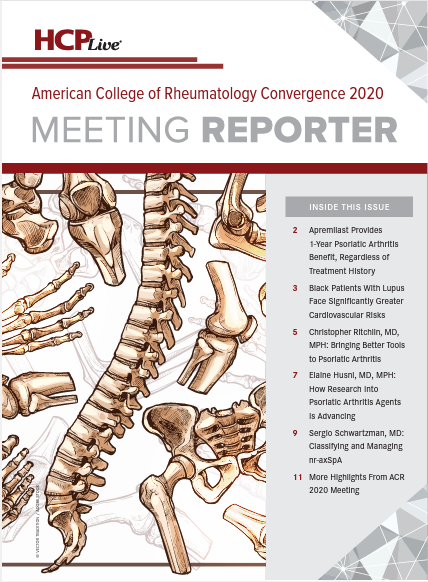Publication
Article
Supplements
Rheumatic Patients in Africa, Asia Faced Hydroxychloroquine Shortage due to COVID-19
Author(s):
New survey findings show the antimalarial drug's promotion for potential SARS-CoV-2 benefit early into the pandemic led to needing patients losing access.

Antimalarial therapies hydroxychloroquine and chloroquine—once at the heart of clinical debate regarding their failed benefit for preventing and treating SARS-CoV-2 infection—were in short supply for their evidenced purpose of treating rheumatic disease in the early months of the coronavirus 2019 (COVID-19) pandemic.
In data presented at the American College of Rheumatology (ACR) Convergence 2020 this week, a team of international investigators reported findings indicating that patients in regions of Africa and Southeast Asia had far greater difficulty accessing hydroxychloroquine and chloroquine to treat patients with rheumatic disease than did regions of the Americas and Europe.
Such shortages led to greater rates of deteriorating mental and physical health among patients in need of the antimalarial therapy, while their resourcing in other parts of the world for a coronavirus-centric indication the drugs continually failed to live up to drew the ire of investigators.
“Antimalarials did not protect patients with rheumatic disease from COVID-19 or from hospitalization as a result of COVID-19,” they wrote. “The unintended harmful consequences of repurposing antimalarials, without adequate evidence for benefit, highlights the importance of maintaining scientific rigor even in the context of a pandemic.”
Investigators, led by Emily Sirotich, a PhD student in Health Research Methodology at McMaster University, sought to interpret whether antimalarial therapies were indeed associated with lowered COVID-19 infection risk, what were the observed prevalence of drug shortages during the pandemic, and what impact such shortages had on patient populations.
The “empirical” promotion and use of hydroxychloroquine and chloroquine for SARS-CoV-2 infection treatment and prevention, prior to any robust efficacy data, could have led to harmful shortages for patients with rheumatic diseases, they suggested.
They used the COVID-19 Global Rheumatology Alliance (C19-GRA) Patient Experience Survey, an online questionnaire sent to patient support organizations and through social media in April 2020, to gauge international perspectives. The survey allowed for patients with rheumatic disease, or parents of such pediatric patients, to anonymously contribute data pertaining to their diagnosis, treatment regimen, COVID-19 status, and disease outcomes.
Sirotich, Patient Engagement Lead of the C19-GRA, explained in a statement that the survey was established at a time when scientific and research communities were under “extraordinary pressure” to identify effective, safe therapies for SARS-CoV-2.
“Since hydroxychloroquine is an essential treatment for (rheumatoid arthritis) and lupus, reported drug shortages of antimalarials became a major concern,” Sirotich said.
The team assessed the survey for the effect of antimalarial drug availability on patient disease activity and mental and physical health states. They compared mean values with two-sided independent t-tests to identify significant differences.
Their assessment included 9393 respondents, 3872 (41.2%) of whom reported taking antimalarial therapy. Mean patient age was 46.1 years old, with 90% being female.
More than 6% of patients (n = 230) were unable to continue taking antimalarials due to lacking supplies at their pharmacies at the time. Regionally, patients in Southeast Asia (21.4%) and Africa (26.7%) were far more likely to report an inadequate supply than patients in the Americas (6.8%) and Europe (2.1%).
Patients unable to access antimalarials versus those able to experienced notably greater levels of rheumatic disease activity (5.1 vs 4.3; t(244) = 4.44; P <.001), poorer mental health (5.8 vs 6.3; t(252) = 3.82; P <.001), and poorer mental health (5.6 vs 6.4; t(254) = 5.97; P <.001).
What’s more, Sirotich and colleagues observed similar rates of COVID-19 infection among patients on hydroxychloroquine or chloroquine (6.7%) as those not on malarial therapy (4.7%). More than 10% (n = 28) of patients with COVID-19 who were taking antimalarials were eventually hospitalized.
Among the observed 519 patients diagnosed with COVID-19, 68 (13.1%) reported being prescribed an antimalarial for the treatment of the virus.
“The findings from this study highlight the harmful consequences of repurposing antimalarials, without adequate evidence for benefit, on patients who rely on access to their hydroxychloroquine or chloroquine prescriptions for their rheumatic diseases,” Sirotich said in a statement. “It is necessary to maintain scientific rigor even in the context of a pandemic and recognize the potential impacts of drug shortages."
Particularly among rheumatic patients living in developing countries, investigators stressed, there is a growing need for ensured care and access to therapies in the appropriate setting.
The study, “Antimalarial Drug Shortages During the COVID-19 Pandemic: Results from the Global Rheumatology Alliance Patient Experience Survey,” was presented at ACR 2020.




